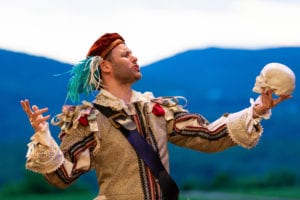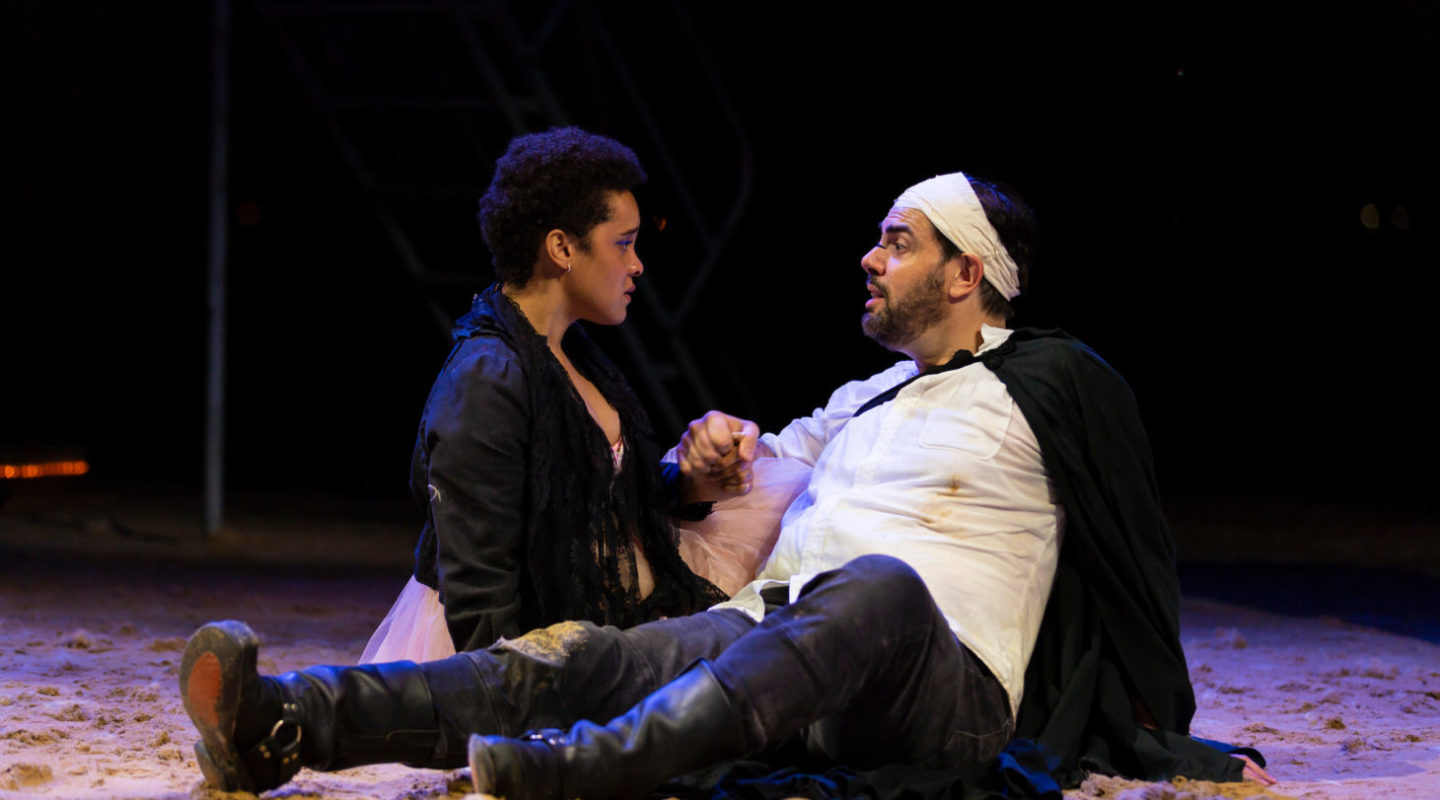
Originally published on August 21, 2019 by Ben Brantley in the The New York Times (Review: A Nose by Any Other Name in a Hudson Valley ‘Cyrano’). A version of this article appears in print on , Section C, Page 5 of the New York edition with the headline: Wooing Roxane, With a Make-Believe Nose.
Jason O’Connell and Brenda Withers’s adaptation of “Cyrano de Bergerac” at the Hudson Valley Shakespeare Festival asks us not to take anything at face value.
GARRISON, N.Y. — Did those people who were preening so happily before their own cameras feel an admonitory chill?
True, theatergoers at the Hudson Valley Shakespeare Festival’s Monday night performance had been encouraged to snap their own pictures. In the carnival-style tent that serves as a theater on the grounds of the Boscobel Estate, there was an unmissable sign labeled “Selfie Booth,” center stage, and a big paper-moon backdrop, with a box of antic props and costumes for posing.
Or to be exact, the sign read “Cyrano’s Selfie Booth.” And had there been such a thing as cameras in the days of the original Cyrano, he would surely never have stood still for one. More likely, he’d have taken a sword to anyone who pointed a lens in his direction.
The last name of this irascible cavalier is de Bergerac, and as you may know, he had a really big nose, which limited his romantic prospects and made the mirror his enemy. His story, as penned by Edmond Rostand in the late 19th century, is perhaps the most famous of all theatrical tales about the shortsightedness of judging people by their looks.
Now Jason O’Connell and Brenda Withers have adapted Rostand’s “Cyrano de Bergerac” as the more familiarly titled “Cyrano,” in a production that moves on to the Two River Theater in Red Bank, N.J., next month. As directed by Meredith McDonough,
with a cast of five led by Mr. O’Connell in the title role, this is an amiable, easygoing interpretation for an age drowning in self-glamorizing self-portraiture, asking us (to crib from Shakespeare) to look not with the eyes, but with the mind.
In a way, the 33-year-old Hudson Valley Shakespeare Festival has always promoted such a perspective. Using minimal sets, throwaway costumes and performers of varying professionalism, this troupe asks its audiences to look beyond the evidence of their eyes and join in a collective act of make-believe.
In this instance, for example, Mr. O’Connell is wearing no nose-extending prosthesis like the ones sported by Jose Ferrer, Gerard Depardieu and Steve Martin in film adaptations. A black piece of tape has been attached above one nostril to signal his distinctive proboscis.
Mr. O’Connell’s résumé includes a confessional one-man comedy show (“The Dork Knight,” seen at Joe’s Pub in New York). Accordingly, he brings out the stand-up artist in Cyrano, a man who brandishes one-liners as if they were rapiers.
He may be a tad too sweet for his combative character. But he’s eminently likable. (It should be fascinating to see what Peter Dinklage, of “Game of Thrones,” makes of the same role in the forthcoming New Group musical “Cyrano” in Manhattan.)
Mr. O’Connell’s fellow cast members — Britney Simpson (as Cyrano’s love, Roxane), Luis Quintero (as Roxane’s love, Christian), George Merrick and Nance Williamson — each play multiple roles, changing genders, ages and dispositions via scarves, shawls and headgear. It seems safe to say that none of them look like central casting’s idea of most of the parts they play.
But throughout their quicksilver transformations, we accept them as who they say they are, because that’s the bargain that theater demands of us. There’s a welcome, self-conscious wit in such metamorphoses, as when Mr. Merrick, playing a foot soldier, looks in wonder after the aristocratic fop who has just left the stage, also played by Mr. Merrick.

George Merrick performing against the backdrop of the Hudson River Valley. Credit T Charles Erickson
If a certain amount of vaudevillian shtick is required to keep everyone’s identities separate, that’s just fine. At a full two and a half hours, the show is perhaps a shade too long for a production that often traffics in quick-sketch characterization.
But a familiar story is told clearly and appealingly, in a contemporary language that includes a host of sometimes witty, sometimes strained variations on Cyrano’s self-mocking wit. (In this version, the character’s catalog of pre-emptive insults about his nose includes the lines, “Did you need a special permit for that extension?” and “Based on the Pinocchio principal, I’m assuming you work in politics?”)
The set, as usual, is spectacular. I mean the Hudson River Valley landscape on view from the open-sided tent, which provides a ready-made backdrop out of Frederic Church, changing color and perspective as twilight turns to night. “Cyrano,” though, provides fewer opportunities for exploiting such natural beauty than the cosmically minded Shakespeare plays that are the troupe’s bread and butter.
But there’s a wonderful, man-made full moon for the finale that seems to have been conjured out of the river itself. Then there’s the moment when the plucky Roxanne materializes out of the darkness amid a battlefield of starving soldiers as a Beyoncé-like goddess, in an immense gown that transforms her into a walking cornucopia. (Jessica Wegener Shay is the costume designer.)
This turns out to be only an illusion. But then, so is the Beyoncé in selfies and on album covers.

